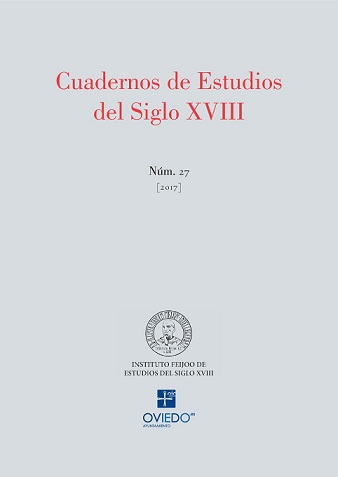Resumen
RESUMEN
Don Manuel José Fernández-Vinjoy y Pérez de Penafonte, natural de Castropol, perteneció a una noble familia asturiana, cursó estudios eclesiásticos, fue clérigo en Madrid y en 1793 se le nombró Canónigo de la Santa Iglesia Catedral de Oviedo, en donde desempeñó diversas funciones, entre otras, las de Contador Racionero Mayor y Menor. En 1794 recibió el honor y título de Caballero de la Orden de Carlos III. Destacamos en este estudio su faceta de humanista, experto conocedor de las lenguas clásicas, culto, riguroso y elogiado traductor de las obras de Filón de Alejandría, de quien introdujo en España tres de ellas (El repúblio más sabio, El héroe estoico o el hombre libre y su Poema sagrado) por ser de utilidad para el bien común, probando que no puede haber verdadera libertad donde no domina la virtud.
PALABRAS CLAVE
Castropol, traductor de Filón de Alejandría, filosofía racional, estoicismo, humanista, Jovellanos, Cabildo ovetense.
TITLE
Manuel José Fernández-Vinjoy y Pérez de Penafonte (translator, canon and designer)
ABSTRACT
Mr. Manuel José Fernández-Vinjoy and Pérez de Peñafonte, native of Castropol, belonged to a noble family from Asturias, he studied ecclesiastics, was a clergyman in Madrid and in 1793 he was appointed Canon of the Holy Cathedral Church of Oviedo, where he performed various functions, among others, those of Mayor and Minor Accountant Prebedery. In 1794 he received the honor and title of Knight of the Order of Charles III. We emphasize in this study his facet of humanist, expert in classical languages, cult, rigorous and praised translator of the works of Philo of Alexandria, of whom he introduced in Spain three of them (The wisest Republican, The stoic hero or the free man and Sacred Poem) for being of utility and for the common good, proving that there can be no true freedom where virtue does not dominate.
KEY WORDS
Castropol, translator of Philo of Alexandria, rational philosophy, stoicism, humanist, Jovellanos, incumbent of the church from Oviedo.

